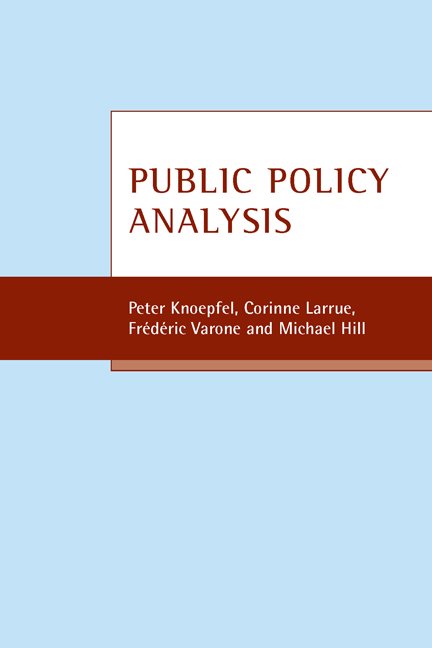Preface to the English edition
Published online by Cambridge University Press: 14 January 2022
Summary
This book is a manual on public policy analysis; it makes no claim to present a new theory of the state. It is aimed at students and practitioners of public administration. It is based upon a book originally written in French titled Analyse et pilotage des politiques publiques.
The manual is structured and written in a way that is comprehensible to readers who may not have an academic background in the social sciences, but introduces and explains key ideas from law, sociology, political science and administrative science. It presents an analytical framework that can be used to carry out empirical studies on different public policies. It can also be used as an aid in the formulation, implementation and/or evaluation of new public policies.
Based on analysis and research carried out by the authors and applied to different domains of public action, this manual presents a model for the analysis of public policy as well as examples of the application of this model in everyday political-administrative situations. The original examples were mostly drawn from Switzerland and France. Most of these have been retained; others have been added from the UK. There is a substantial British literature from which it has only been practical to draw on to a limited extent, using examples that illustrate the model used in the book. For wider material readers could usefully refer to Dorey's Policy making in Britain (2005) or to Richards and Smith's Governance and public policy in the UK (2002).
France and Switzerland basically represent two extremes in terms of their modes of government: Switzerland is a federal state with direct democratic procedures based on consensus between the political parties while at the same time displaying a high level of linguistic, confessional and regional diversity; and France is a centralised state that is primarily founded on a system of representative democracy, organised on the basis of political bipartisanship and rooted in a shared republican history that aims (for at least the past two centuries) to homogenise local situations in terms of language, mode of political representation and support for one and the same conception of the public interest. The UK is (notwithstanding recent devolution) another centralised state, but with a rather different set of institutions to France.
- Type
- Chapter
- Information
- Public Policy Analysis , pp. vii - viiiPublisher: Bristol University PressPrint publication year: 2007

